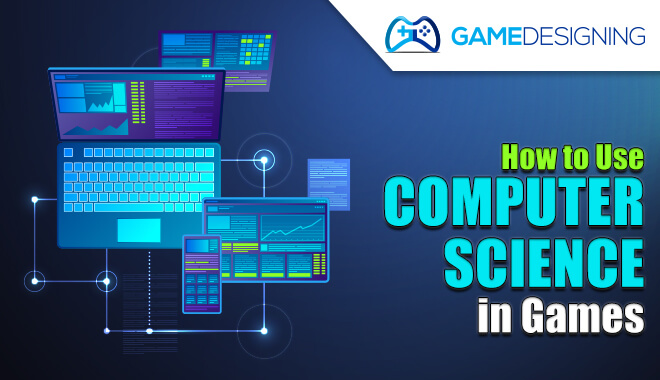
If you’re an avid gamer who loves computers, you may be thinking about pursuing a career as a game developer. Game development is a specialized, comparatively small, and lucrative industry.
Retail gaming in the United States is estimated to be worth $4.19 billion in 2023. As expected, graduates who work on video games are well rewarded. Entry-level positions earn around $44,000 a year while senior and lead programmers easily get over $120,000 annually.
A degree in computer science is a great way to receive formal training and get your foot in the door. So, in this post, we’ll discuss how computer science in video games can be relevant, the types of degrees you can get, its professional benefits, and more.
What Is Computer Science?
Commonly referred to as CS, a computer science degree is a broad field that studies computer systems as a whole, including networks. A computer science curriculum entails learning programming languages, data science, software development, information security, and network architecture.
Studying CS gives you the flexibility to work in many technologically focused fields, including gaming. Studying this high-demand and high-reward degree is an excellent idea if you’re aspiring to join the gaming industry.
What Are the Types of Computer Science Degrees?

There are four types of computer science degrees that you can pursue based on the field and job you’re looking for. As always, the degree with the shortest duration will help you get beginner-level jobs while those that are longer will help you win higher-paying roles.
Some of the computer science degrees you can pursue include:
Associate Degree
This degree requires students to achieve 60 credits over a period of two years. It can help you get entry-level jobs as a computer programmer, web developer, or computer systems administrator.
Bachelor’s Degree
A Bachelor’s degree involves about 120 to 128 credits. It usually takes four years to earn. By pursuing this degree, you can get an entry-level job in software design, computer engineering, and computer science.
Master’s Degree
Pursuing a Master’s degree is an excellent way to get a more specialized role and thus a higher-paying job. The course calls for 45 to 50 credits and is two years long. This is a recommended course for aspiring computer scientists and information research scientists.
Most educational institutions require master’s degree candidates to have a computer science degree or a degree from similar fields of study like science, technology, engineering, or math (STEM) before joining a master’s degree program.
Doctoral Degree
Easily the toughest and most challenging of all, a doctoral degree takes about 4 to 5 years to complete. It involves a lot of studying and researching. Most doctoral degrees require a thesis.
A doctoral degree is best suited for people who want to get high-level jobs in teaching, research, and computer science.
Master’s and doctoral degrees aren’t necessary for a career in gaming. Getting experience with a game production company is often a better route. You can also get a boost by developing a strong portfolio and becoming proficient in different programming languages.
Benefits of Computer Science in Gaming

How does computer science play a role in games? A computer science degree opens up opportunities for professionals who want to work in tech-focused fields. As a result, it is versatile and always in demand.
Here are the main benefits of pursuing a degree in computer science:
It builds a solid foundation.
A computer science degree teaches computer languages which is essential when designing games. Game designers must know various coding languages to create levels, interactions, progression, etc.
Computer science gives professionals a headstart.
Computer science in gaming will help you develop games. Since computer science familiarizes you with various operating systems, computer graphics, and languages, it’s a great foundation for programming-related roles. It will give you a thorough understanding of the back-end tasks that go into creating a game.
It is versatile.
Once you understand the technical aspects, you can use your degree as a starting point for various specializations. Whether you want to go deeper into game architecture, design, testing, quality assurance, or another aspect, a computer science degree will allow you to further hone your other skills and pursue the niche that interests you.
How is Computer Science Used in Video Games?
How has computer science impacted games? Games reflect advancements in technology and computer science. Though we started with 2D animation, we’ve progressed by leaps and bounds. Modern gaming engines are more realistic, immersive, and playable because of:
Upgraded Graphics
Technology has allowed developers to create better graphics. The days of pixelated graphics are long gone. In fact, some of today’s games are so realistic that gameplay looks like cinematic sequences.
New-age graphics capture people’s likenesses well. They even emphasize specific features and expressions. Backgrounds look like real-life images.
The newest Playstation 5, for example, features 8K graphics at a 60Hz or 4K output with a 120 Hz refresh rate. This is a far cry from the Super Nintendo Entertainment System (SNES) that came out in 1990 with its 256×224 resolution and 8×8-pixel graphics.
Allows Multi-Player Gaming

Some decades ago, only players in the same room could play with each other on the same device. As computer science progressed, so did multi-player experiences. Players can connect with each other and play games from computers, laptops, tablets, VR headsets, and smartphones.
Geographical boundaries are no longer a limitation. You can play a game with other players no matter where in the world they are as long as they have an internet connection and a copy of the same game.
Accessible Gaming

There are so many platforms on which we can play games from mobile phones, video game consoles, and computers. Video games are also available at different price points. Some are even free to play and don’t need Wi-Fi.
Gaming is more accessible than ever. Even the conservative senior citizen who isn’t that tech-savvy can play a game on their mobile phone.
Augmented and Virtual Reality

How has computer science impacted games? Computer science has given birth to new ways in which we can experience games like augmented and virtual reality.
A fairly new concept, augmented reality makes players feel like the game is part of the real world by incorporating elements in the player’s environment. A great example of augmented reality is Pokemon Go.
Virtual reality (VR), on the other hand, is quite the opposite. It makes the player feel like they’re in the game rather than where they are. Virtual reality games involve the use of a headset that provides audio and video input from the simulated world.
Computer Science Graduates and Gaming Careers
You might be thinking that a computer science degree will help you get a job as a programmer and while that’s certainly true, it isn’t the only job you can get. Game development requires several types of technology professionals.
Once you have a job in the gaming industry, you might notice similar or more specialized roles that you feel inclined to pursue. Game designer, programmer, and tester are just three of the possibilities.
Check out their specific roles below.
Game Designer
A game designer is someone who brainstorms ideas and concepts, builds prototypes, and develops the game’s mechanisms. A designer is also responsible for deciding on how the game functions such as creating systems or gameplay rules. They also assist with storyline development to ensure that games are playable and engaging.
Simply put, a game designer is someone who oversees the foundation, function, and execution of the game.
Game Programmer
Although someone studying CS can become a game designer or programmer, the two roles entail different responsibilities.
A game programmer is someone who develops software for video games. They write and translate codes across operating systems to ensure the design is fully implemented and functional. They turn the designer’s vision into a reality.
Meanwhile, programmers work closely with game designers or developers to deliver the final product. They are involved in all iterations of the game since they are responsible for producing the backend or the engine on which the game runs.
Though the role has historically had impressive growth rates, note that demand for computer programmers is expected to decline by 11% until 2032. Despite this outlook, there are an average of 6,700 openings for computer programmers each year.
Games Tester
You do not need to have a computer science degree to become a game tester, but having knowledge about operating systems and video games helps.
A game tester tests games before they are released to the public. They look for glitches, coding inaccuracies, plotholes, problems with the game economy, and much more. A tester will check if the game is playable and is in charge of ensuring quality control.
If a game tester finds a bug or something that needs to be changed, their feedback is relayed to the game developers and programmers who then work on the iterations.
Can You Be a Game Tester Without a Computer Science Degree?
Most job descriptions for testers require a computer science degree but some companies are more lenient. As a minimum, you’ll need a sound understanding of how games work. It also helps if you’re an avid gamer and have excellent soft skills.
Other Degrees That Can Help You in Gaming

If a computer science degree doesn’t interest you, you can still consider other degrees that are considered valuable in the industry. Let’s take a look at some of them.
Video Game Programming and Development
Many specialized universities have dedicated degrees in video game programming and development. The curriculum covers game theory, interface design, and game development production.
Since the degree is focused on gaming, this type of certification isn’t as versatile. So, if you decide later on that you’d rather pursue another niche in technology, you may not be able to do so as easily.
However, if you’ve decided on a career in game development, this is an excellent starting point.
Computer Animation
Computer animation teaches you to create characters, backgrounds, and 2D/3D animation graphics for video games. Some classes also emphasize storytelling which helps you develop your own narratives.
If you want to do artwork for computer games, learning computer animation is a great way to prepare for a career in creating computer-generated imagery (CGI).
Software Engineer
Software engineering entails developing, testing, and deploying computer applications to execute practical tasks. It involves learning software development and programming languages. Next to computer science, it’s the next best degree after computer science if you want to pursue a career in the gaming industry.
Graphic Designing
The program will teach you how to create visually pleasing layouts and designs across multiple platforms from print to video. You will learn to create 2D and 3D designs along with animation which is always a plus in the gaming industry.
That said, graphic designing is versatile as well. Almost all industries need creative minds, so if you’re a naturally talented individual, your options may be just as endless.
Conclusion
Computer science is a versatile degree that encompasses a broad field of studies. You’ll need to learn computer systems, languages, networking, and cyber security. Enrolling in this program allows you to work in many technologically focused fields, including gaming.
So, if you have your heart set on joining the gaming industry, pursuing a degree in computer science is an excellent idea. It covers the bases and gives you a headstart as a game developer, game programmer, or game tester.
Moreover, since the gaming industry generates large revenues, you’re likely to be paid generously. One of the interesting facts about computer science in games is that it was one of the industries that continued to soar during the global pandemic (digital game spending grew by 12% while paid downloads increased by 21%).
Should you decide later on that game development isn’t for you or you just want to try another industry, you can easily move to other tech-related fields.
Though there may be newer courses out there that are more focused on gaming, there are few fields of study that can match the versatility and practicality of a computer science degree.
